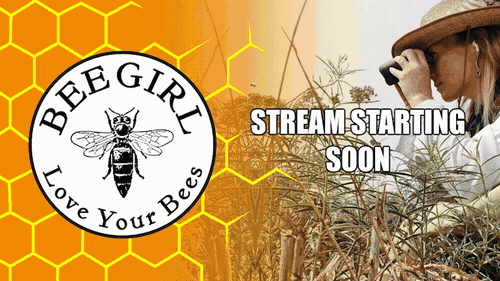BGO (the Bee Girl organization) is a grassroots nonprofit centred on bee habitat conservation through research, regeneration, & education.
We envision a future where kids frolic in pastures of flowers, buzzing with bees, alongside happy and healthy ecological farmers and ranchers.
Our organization aims to conserve our bees by regenerating bee habitats and inviting people, including kids, to fully understand the importance of bees to our food system and wild landscapes, and engage them in our work. We have formed unique and important partnerships with ranchers, winemakers, universities, and other nonprofit partners to conserve bee habitat by shifting mindsets through research, advocacy, inspiration, and education. We work hard to get pesticide-free flowers in the ground to improve soil health – and in turn – produce more flavorful and nutrient-dense food and drink, and most importantly, feed bees.
The Bee Girl team engages with communities across the nation, and the globe, spreading knowledge and bringing a sense of wonder from the hive to the people.
Since our founding in 2010, the Bee Girl organization has reached over 87,000 adults and 16,000 kids through over 200 presentations in 20 US states, 3 Canadian provinces, and 6 countries. We've given away over 500,000 square feet of sunflower seeds to kids, currently care for about 975,000 honey bees in six apiaries, and study bees and their flowers on thousands of acres in Oregon, Montana, The Dakotas, and Nebraska.
This work is important to all of us because one out of every three bites of food that we eat is thanks to a bee! Honey bees, and their close “native bee” cousins, add $29 billion to US farm income (Cornell Chronicle, 2012) through pollination services.
However, honey bee hive losses continue to be high and unsustainable year after year (NASS, Bee Informed Partnership, 2020). Beekeeping is more expensive and more difficult every year, even for the great beekeepers.
And it’s not only honey bees and beekeepers that are struggling. There are over 4,000 species of bees in North America, and a recent study looking at collectible bee data found that half of the bee species monitored are in decline. Nearly 1 in 4 bee species in this study is imperilled and at increasing risk of extinction (USFWS, 2017).
Our bees, the pollinators of food for humans and wildlife, are lining up for their place on the endangered species list.
Beekeepers, researchers, and advocates have defined the issues causing bee loss. Experts agree on the deadly forces of climate change, pesticides, disease/pests, and habitat destruction.
Climate change creates a myriad of issues for bees including extreme weather events like heat waves, drought, flooding, and fire. These events directly affect bees by burning and flooding their homes, but also indirectly affect bees by destroying floral resources and increasing pest and disease pressure.
Pesticide use and misuse continue to be a serious threat to our bees, as well as to human community health. Early in 2021 our friend and colleague, Dr. Judy Wu-Smart, called out AltEn – an ethanol plant that had not only poisoned and killed a whole research apiary in Mead, Nebraska, with a neonicotinoid residue spill, but had also sickened the community, and killed pets and songbirds.
In the summer of 2022, BGO will be travelling to Mead to support the efforts of Dr. Wu-Smart by collecting data and launching a petition to stop the poisoning of the bees and the local community.
Habitat destruction is not only harmful in itself; it compounds the effects of climate change, pests and disease, and pesticides. The majority of American bees currently live, eat, and work in toxic sludge.
More than 90 percent of North America’s natural grasslands have been converted to agricultural use, putting prairies among America's rarest biomes, replacing natural plant communities with monocultures of wheat, corn, and soy. From 2006 to 2011, more than 1 million acres 7 (530,000 hectares) of U.S. grasslands were lost.
Manicured evergreen lawns in rural and urban areas have also replaced wildflower meadows and bee tree woodlands.
With the advance of industrial mono-crop agriculture, and expanding urban areas, the majority of the nation's floral bee habitat in agricultural areas has been destroyed. Nectar and pollen-producing flower-rich hedgerows and cover crops have been replaced by commodity crops and chemical inputs.
Though agriculture is a leading cause of these issues, it also holds the solution. Regenerative agriculture holds the key to increasing bee habitat and health.
We believe the key to bee survival is nutritionally dense floral landscapes created with regenerative methods. Regenerative agriculture reduces, and eliminates, the need for pesticides and creates healthy soil for a diversity of flowers to thrive. The University of Minnesota’s Dr. Marla Spivak, a world-renowned bee expert and MacArthur Fellow, pointed to natural, diverse pesticide-free pollen as the foundation for bee health and survival in her keynote speech at the 2019 American Beekeeping Federation Conference.
Our method is to ensure bee health through propagating a diversity of specific bee-friendly flowers is embedded into the regenerative agriculture movement through our “Regenerative Bee Pasture” and our “Bee Friendly Vineyards” projects.
With your support, we will continue our work, striving to create a better world for bees and our rural communities by addressing the four challenges listed above through grassroots, boots-on-the-ground-farmer-driven research, advocacy, education, and mindset shift facilitation.
In the book “The Unsettling of America,” Wendell Berry states, “The soil is the great connector of lives, the source and destination of all. It is the healer and restorer and resurrector, by which disease passes into health, age into youth, death into life. Without proper care for it, we can have no community, because without proper care for it we can have no life.” We have no doubt that we are building so much more than soil with the project. We are making connections between diverse human and biological communities for the health of bees, and the whole planet.
Facilitating a mindset shift to embracing an agricultural system that utilizes the principles of nature and regeneration; moving away from the mindset of control and exploitation in ag is our real work. Humans have an ancient and powerful connection with bees. We consider it an honor to work with them in a reciprocal relationship to do this work.


Helpful Links:
- Learn more about the Bee Girl Organization
- Start fundraising for the Bee Girl Organization using Streamlabs Charity
- Download the free Overlays for Streamlabs Desktop
- Install the matching Charity Alerts in Streamlabs Desktop
- Grab the Alerts for use in other broadcasting software